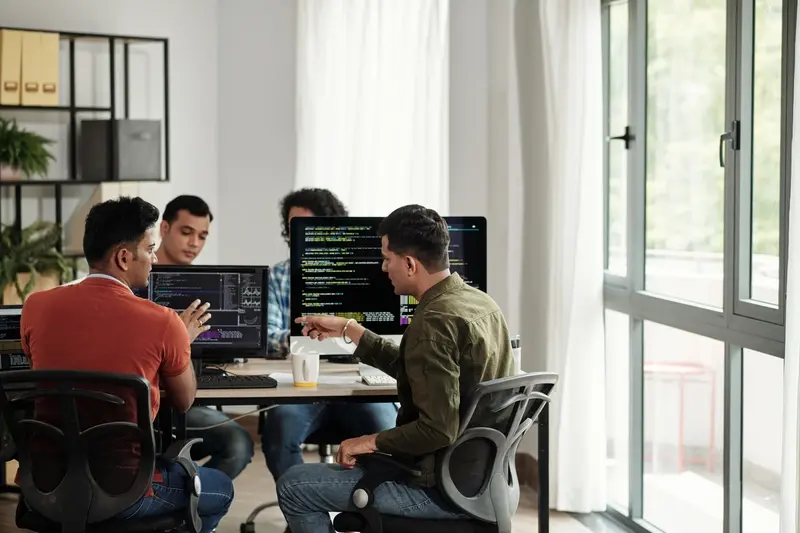How Do Remote Teams Handle Code Reviews Effectively?
Picture a mobile app development team spread across London, Berlin, and Sydney. The London developer pushes code at 5pm, the Berlin teammate reviews it over breakfast, and by the time Sydney wakes up, there's already a heated discussion about variable naming conventions. Sound familiar? This scenario plays out thousands of times every day in distributed teams building mobile apps around the world.
Remote work has transformed how we build software—and code reviews have become the backbone of quality collaboration. When your team isn't sitting in the same office, you can't just tap someone on the shoulder to ask about that tricky function they wrote. You need systems, processes, and most importantly, a shared understanding of how to review each other's work effectively.
The best remote teams don't just review code; they use code reviews as a way to stay connected, share knowledge, and maintain quality standards across time zones.
I've worked with distributed teams for years now, helping them build mobile apps that millions of people use daily. What I've learned is that successful remote code reviews aren't just about catching bugs—they're about creating a culture where team members can collaborate effectively despite being thousands of miles apart. The teams that get this right ship better products faster; the ones that don't often struggle with inconsistent code quality, frustrated developers, and delayed releases. This guide will show you exactly how to set up code review processes that work for remote mobile app development teams, covering everything from choosing the right tools to managing the human side of giving feedback across cultures and time zones.
What Are Code Reviews and Why Remote Teams Need Them
Code reviews are exactly what they sound like—when developers look at each other's code before it gets added to the main project. Think of it like proofreading an essay, but for computer programs. One person writes some code, then another person (or sometimes a few people) checks it over to make sure it works properly and follows the team's rules.
Now, you might wonder why this matters more for remote teams than office-based ones. Well, when you're all in the same building, you can just tap someone on the shoulder and say "Can you quickly check this bit of code for me?" But when your team is spread across different cities—or even different countries—you need a proper system in place.
Why Remote Teams Can't Skip Code Reviews
Remote development teams face unique challenges that make code reviews absolutely necessary. Without them, you're basically flying blind. Here's what code reviews help prevent:
- Bugs that could have been caught early slipping into the final app
- Code that only one person understands (which becomes a nightmare if they leave)
- Security problems that hackers could exploit later
- Different coding styles that make the project messy and hard to maintain
- Team members working in isolation without learning from each other
The Real Benefits Beyond Bug Catching
Code reviews do more than just spot mistakes—they're actually one of the best ways for remote teams to stay connected and learn from each other. Junior developers pick up tricks from senior ones, and sometimes fresh eyes spot issues that experienced developers miss. It's like having a safety net that also helps everyone become better at their job.
The key is making sure your code review process works smoothly across time zones and doesn't slow down development. That's what we'll cover in the next chapters.
Setting Up Your Remote Code Review Process
Getting your remote code review process right from the start makes everything else fall into place—trust me on this one. I've seen distributed teams struggle for months because they skipped the foundation work, and honestly, it's painful to watch. The good news is that setting up a solid process isn't rocket science; you just need to think through the basics before your mobile app development gets underway.
Start with clear expectations about what gets reviewed and when. Every piece of code that goes into your mobile app should pass through at least one other pair of eyes—no exceptions. This means establishing rules about pull requests, who reviews what, and how quickly reviews need to happen. For distributed teams working across different locations, timing becomes even more critical.
The Foundation Elements
Your process needs structure, but not so much that it slows everyone down. Here's what you need to nail down first:
- Who reviews code from each team member
- How long reviewers have to respond
- What happens when reviewers disagree
- Which types of changes need extra scrutiny
- How to handle urgent fixes that can't wait
Set up automated reminders for pending reviews—distributed teams often forget what's sitting in their queue when working across time zones.
Quality Collaboration Standards
The magic happens when your process supports quality collaboration rather than hindering it. Make sure reviewers know they're looking for logic errors, security issues, and code that follows your team's standards. But they should also check that the code makes sense to someone who didn't write it—this is particularly important for mobile app projects where different developers might need to jump in later.
Choosing the Right Tools for Distributed Development
When your team is scattered across different cities or countries, picking the right tools becomes more than just preference—it becomes the foundation of how well your code reviews actually work. I've seen teams struggle for months simply because they chose tools that didn't play nicely together or weren't built for remote work.
The most popular platforms like GitHub, GitLab, and Bitbucket all offer solid code review features, but they're not all created equal. GitHub's pull request system is probably the most familiar to developers, whilst GitLab gives you more control over workflows and approval rules. Bitbucket integrates beautifully with other Atlassian tools if your team already uses Jira or Confluence.
Features That Matter for Remote Teams
Look for tools that support inline commenting—this lets reviewers leave feedback directly on specific lines of code rather than sending vague messages. Automated checks are brilliant too; they catch basic issues before human reviewers even look at the code. Integration with your IDE means developers can see review comments without switching between applications constantly.
Beyond the Basic Platform
Don't forget about communication tools that support your review process. Slack or Microsoft Teams can send notifications when reviews are ready, whilst tools like CodeClimate or SonarQube can help maintain code quality. The key is finding tools that work together seamlessly—your developers shouldn't need to juggle five different applications just to submit a simple code change.
The best tool is often the one your team will actually use consistently, not necessarily the one with the most features.
Building a Culture of Constructive Feedback
Getting feedback right in distributed teams isn't just about being polite—it's about creating an environment where your mobile app gets better with every review. When team members are scattered across different locations, the way you give and receive feedback can make or break your development process.
The secret lies in focusing on the code, not the coder. This sounds simple but it's surprisingly hard to get right when you're working with people you might never meet face-to-face. Instead of saying "you forgot to handle this error," try "this error case needs handling." It's a small change that makes a huge difference to how people receive criticism.
Making Feedback Actionable
Vague comments like "this looks wrong" don't help anyone improve. Your distributed teams need specific, actionable feedback that explains what needs changing and why. When reviewing mobile app code, point to exact lines, suggest alternatives, and explain the reasoning behind your suggestions.
The best code reviews feel like pair programming sessions, even when team members are thousands of miles apart
Building Trust Across Time Zones
Quality collaboration depends on trust, and trust takes time to build in remote settings. Start by assuming positive intent—that developer in another timezone isn't trying to break your mobile app, they're trying to solve a problem with the information they have. Encourage questions, celebrate learning moments, and remember that today's junior developer reviewing your code might spot something you missed.
The strongest distributed teams create feedback cultures where everyone feels safe to both give and receive honest input. This doesn't happen overnight, but it's worth the investment for the quality improvements you'll see in your final product.
Managing Time Zones and Communication Challenges
Time zones can make or break remote code reviews. I've seen teams struggle for months because they couldn't figure out when to actually review each other's code—and honestly, it's one of those problems that sounds simple until you're living it every day.
The biggest mistake teams make is assuming everyone needs to be online at the same time. You don't need synchronous reviews for most code changes. What you need is a system that keeps things moving without anyone having to stay up until 2am to get feedback on their pull request.
Creating Review Windows That Work
Smart teams establish review windows rather than expecting instant responses. Here's what works best for managing remote development teams:
- Set clear expectations for review turnaround times (usually 24-48 hours)
- Identify overlap hours when multiple time zones are active
- Rotate who handles urgent reviews so no single location gets stuck with all the late-night work
- Use asynchronous tools that capture context without requiring real-time discussion
The key is being explicit about communication. When someone leaves a code comment, they should explain not just what needs changing, but why. Remote reviewers can't tap you on the shoulder for clarification—they need complete thoughts in writing.
Making Documentation Your Best Friend
This brings us to documentation, which becomes absolutely critical for distributed teams. Every code review should include enough context that someone three time zones away can understand the problem you're solving and why you chose this particular solution.
Don't overthink it though. A few sentences explaining the business logic or linking to the relevant ticket is often enough. The goal is reducing the back-and-forth messages that can stretch a simple review across multiple days when team members are never online together.
Quality Standards That Work Across Locations
When your mobile app team is spread across different cities or countries, keeping code quality consistent becomes tricky. What passes as "good enough" in one location might not meet the standards expected elsewhere. This isn't about one team being better than another—it's about creating clear, measurable standards that everyone can follow regardless of where they're working from.
The secret lies in making your quality standards specific and measurable. Instead of saying "write clean code," define what that means. Set rules like "functions must not exceed 50 lines," "all public methods need documentation," or "test coverage must be above 80%." These concrete guidelines remove guesswork and cultural interpretation from the equation.
Automated Quality Checks
Automation is your best friend here. Set up automated tools that check code style, run tests, and flag potential issues before any human reviewer gets involved. This creates a consistent first line of defence that works the same way whether your developer is in London, Mumbai, or São Paulo.
Create a quality checklist that reviewers must complete for each pull request. Include items like "Does this code follow our naming conventions?" and "Are edge cases handled properly?" This keeps reviews thorough and consistent across all team members.
Documentation That Travels
Your quality standards need to be documented clearly and kept up to date. Create coding guidelines, review checklists, and examples of both good and bad code. Make these resources easily accessible to everyone on the team. When standards are written down and visible, there's no room for confusion about what's expected—no matter what time zone someone is working in.
Conclusion
Getting code reviews right for remote teams isn't rocket science—but it does require some thought and planning. I've worked with distributed development teams for years now, and the ones that succeed all have something in common: they treat code reviews as conversations, not checkboxes to tick.
The tools you choose matter, but they're not the magic bullet. Whether you go with GitHub, GitLab, or something else entirely, what counts is how your team uses them. The best code review tool in the world won't help if your developers are reviewing code at 2am because nobody thought about time zones; or if feedback sounds like personal attacks rather than helpful suggestions.
Building quality standards that work across different locations takes time. You can't just copy what worked for your office-based team and expect it to translate perfectly. Remote teams need clearer guidelines, better documentation, and more patience with async communication. But when you get it right—and most teams do with a bit of practice—the results speak for themselves.
Code quality improves. Team knowledge sharing gets better. People feel more connected to the codebase and each other, even when they're scattered across different continents. Your remote code review process becomes less about catching bugs (though it does that too) and more about building a stronger development team. That's when you know you've cracked it.
Share this
Subscribe To Our Learning Centre
You May Also Like
These Related Guides

How Do You Handle Communication Barriers With Remote Development Teams?

How Long Do Code Reviews Take And Do They Slow Down Development?



